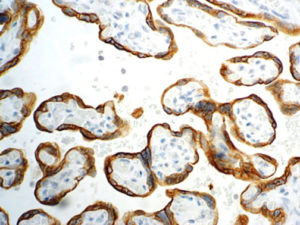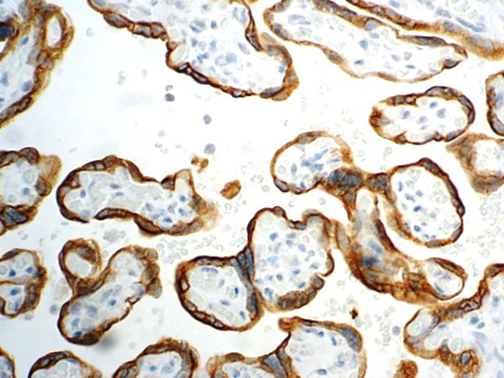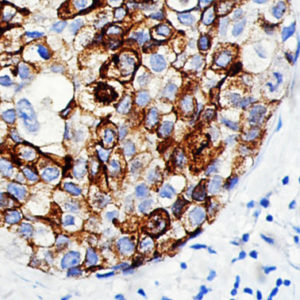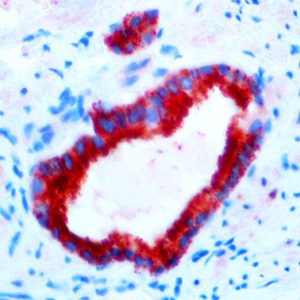
IHC of PLAP on an FFPE Placenta Tissue
| Intended Use | For In Vitro Diagnostic Use. | |||||||||||||||||||||||||||||||||||
| Summary and Explanation | Alkaline phosphatase, placental type also known as placental alkaline phosphatase (PLAP) is an allosteric enzyme that in humans is encoded by the ALPP gene. PLAP is found in trophoblast cells of normal mature human placenta, Seminomas of testis and Ovarian Carcinomas. Detection of alkaline phosphatase in serum is a marker for Ovarian and Testicular Cancer. This antibody reacts with a membrane-bound isoenzyme of placental alkaline phosphatase occurring in the placenta during the 3rd trimester of gestation. This antibody immunoreacts with Germ Cell Tumors and can discriminate between these and other neoplasms. Somatic neoplasms (e.g., breast, gastrointestinal, prostatic and urinary cancers) may also immunoreact with antibodies to PLAP. PLAP positivity, in conjunction with keratin negativity, favors Seminoma over Carcinoma. Germ Cell Tumors are usually keratin positive but they regularly fail to stain with EMA, whereas most Carcinomas stain with anti-EMA. This antibody has shown cross-reaction with human intestinal alkaline phosphatase. | |||||||||||||||||||||||||||||||||||
| Antibody Type | Mouse | Clone | BSB-47 | |||||||||||||||||||||||||||||||||
| Isotype | IgG2b/K | Reactivity | Paraffin, Frozen | |||||||||||||||||||||||||||||||||
| Localization | Cytoplasmic | Control | Placenta, Testis, Seminomas, Ovarian Carcinomas | |||||||||||||||||||||||||||||||||
| Presentation | PLAP is a mouse monoclonal antibody derived from cell culture supernatant that is concentrated, dialyzed, filter sterilized and diluted in buffer pH 7.5, containing BSA and sodium azide as a preservative. | |||||||||||||||||||||||||||||||||||
| Availability |
| |||||||||||||||||||||||||||||||||||
| Note: For concentrated antibodies, please centrifuge prior to use to ensure recovery of all product. | ||||||||||||||||||||||||||||||||||||




